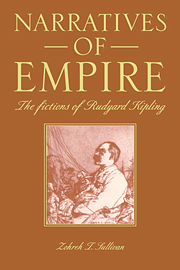1 - Kipling's India
Published online by Cambridge University Press: 18 September 2009
Summary
Rudyard Kipling's art, like the story of imperialism, was a family affair. Marked by unnamed and unacknowledged longing, desire and fear, his texts became the body on which to inscribe the contradictory politics of everyday life in British India. His fiction negotiates an uneasy series of truces between the resistance of the self to the authority of empire, and between the antithetical longings for empire, England and India to be his source of origin, his “very-own” home. Reading Kipling demands a recognition of his alternation between unstable opposites – home/England/empire and home/ India/jungle – with himself eternally divided in unreconcilable longings for both. Reconciliation could, however, be found in metaphor. By projecting metaphors of the inner circle of family, home and club onto the outer circle of nation and empire, Kipling could blur difference by domesticating encounters with the alien kind. And alternately, he blurs the distinction between the dominators and the dominated by including priests from Chubara, carvers from Ala Yar, Jiwun Singh the carpenter and Gobind the one-eyed storyteller within the intimate category of “mine own people” (“preface” to Life's Handicap) – a turn by which he can appropriate the colonized into the domain of his “own” imaginary family.
The epigraph to Life's Handicap – “I met a hundred men on the road to Delhi and they were all my brothers” – may be read as an overture to all Kipling's fiction, which is haunted by a variety of familial configurations from the intimacy of the opium den, to that of the Punjab Club, to the multicolored bondings on the Grand Trunk Road, to Mowgli's magical family in the jungle.
- Type
- Chapter
- Information
- Narratives of EmpireThe Fictions of Rudyard Kipling, pp. 1 - 26Publisher: Cambridge University PressPrint publication year: 1993



